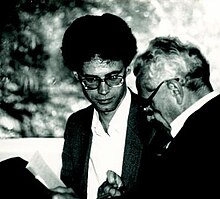Roger Heath-Brown | |
|---|---|
 Heath-Brown in 1986 | |
| Born | 12 October 1952 |
| Citizenship | United Kingdom |
| Alma mater | University of Cambridge |
| Known for | Analytic number theory, Heath-Brown–Moroz constant |
| Awards | Smith's Prize (1976) Berwick Prize (1981) Fellow of the Royal Society (1993) Senior Berwick Prize (1996) Pólya Prize (2009) Sylvester Medal (2022) |
| Scientific career | |
| Fields | Pure mathematics |
| Institutions | University of Oxford |
| Thesis | Topics in Analytic Number Theory (1979) |
| Doctoral advisor | Alan Baker |
| Doctoral students | Timothy Browning James Maynard |
| Website | www |
David Rodney "Roger" Heath-Brown is a British mathematician working in the field of analytic number theory.[1]
Education
[edit]He was an undergraduate and graduate student of Trinity College, Cambridge; his research supervisor was Alan Baker.[2][3]
Career and research
[edit]In 1979 he moved to the University of Oxford, where from 1999 he held a professorship in pure mathematics.[4] He retired in 2016.[5]
Heath-Brown is known for many striking results. He proved that there are infinitely many prime numbers of the form x3 + 2y3.[6] In collaboration with S. J. Patterson in 1978 he proved the Kummer conjecture on cubic Gauss sums in its equidistribution form. He has applied Burgess's method on character sums to the ranks of elliptic curves in families. He proved that every non-singular cubic form over the rational numbers in at least ten variables represents 0.[7] Heath-Brown also showed that Linnik's constant is less than or equal to 5.5.[8] More recently, Heath-Brown is known for his pioneering work on the so-called determinant method. Using this method he was able to prove a conjecture of Serre[9] in the four variable case in 2002.[10] This particular conjecture of Serre was later dubbed the "dimension growth conjecture" and this was almost completely solved by various works of Browning, Heath-Brown, and Salberger by 2009.[11]
Honours and awards
[edit]The London Mathematical Society has awarded Heath-Brown the Junior Berwick Prize (1981), the Senior Berwick Prize (1996),[12] and the Pólya Prize (2009). He was made a Fellow of the Royal Society in 1993,[4] and a corresponding member of the Göttingen Academy of Sciences in 1999.[13]
He was an invited speaker at International Congress of Mathematicians in 1983 in Warsaw and in 2010 in Hyderabad on the topic of "Number Theory."[14]
In 2012 he became a fellow of the American Mathematical Society.[15] In 2022 the Royal Society awarded him the Sylvester Medal "for his many important contributions to the study of prime numbers and solutions to equations in integers".[16]
Heath-Brown was appointed Officer of the Order of the British Empire (OBE) in the 2024 New Year Honours for services to mathematics and mathematical research.[17]
Other
[edit]In September 2007, he co-authored (along with Joseph H. Silverman) the preface to the Oxford University Sixth Edition of the classic text An Introduction to the Theory of Numbers by G.H. Hardy and E.M. Wright.
References
[edit]- ^ "Prof. Roger Heath-Brown, University of Oxford, FRS". Retrieved 4 May 2017.
- ^ Official home page Archived 5 August 2004 at the Wayback Machine
- ^ Roger Heath-Brown at the Mathematics Genealogy Project
- ^ a b "Prof Roger Heath-Brown, FRS". Debrett's People of Today. Archived from the original on 6 September 2012. Retrieved 28 December 2010.
- ^ "Vice chancellor's oration". Gazette.web.ox.ac.uk. Retrieved on 2018-08-29.
- ^ Heath-Brown, D.R. (2001). "Primes represented by x3 + 2y3". Acta Mathematica. 186: 1–84. doi:10.1007/BF02392715.
- ^ Heath-Brown, D. R. (1983). "Cubic Forms in Ten Variables". Proceedings of the London Mathematical Society. Series 3. 47 (2): 225–257. doi:10.1112/plms/s3-47.2.225.
- ^ Heath-Brown, D. R. (1992). "Zero-Free Regions for Dirichlet L-Functions, and the Least Prime in an Arithmetic Progression". Proceedings of the London Mathematical Society. Series 3. 64 (2): 265–338. doi:10.1112/plms/s3-64.2.265.
- ^ Castryck, Wouter; Cluckers, Raf; Dittmann, Philip; Nguyen, Kien Huu (2020). "The dimension growth conjecture, polynomial in the degree and without logarithmic factors". Algebra & Number Theory. 14 (8): 2261–2294. arXiv:1904.13109. doi:10.2140/ant.2020.14.2261. S2CID 140223593.
- ^ Heath-Brown, D. R. (2002). "The Density of Rational Points on Curves and Surfaces". Annals of Mathematics. 155 (2): 553–598. arXiv:math/0405392. doi:10.2307/3062125. JSTOR 3062125. S2CID 15167809.
- ^ Browning, Timothy D. (2009). Quantitative Arithmetic of Projective Varieties. doi:10.1007/978-3-0346-0129-0. ISBN 978-3-0346-0128-3.
- ^ Berwick prizes page at The MacTutor History of Mathematics archive
- ^ "Professor Roger Heath-Brown". The Mathematical Institute, University of Oxford. Retrieved 28 December 2010.
- ^ "ICM Plenary and Invited Speakers since 1897". International Congress of Mathematicians.
- ^ List of Fellows of the American Mathematical Society. Retrieved 19 January 2013.
- ^ "Roger Heath-Brown awarded the Sylvester Medal". www.maths.ox.ac.uk. The Mathematical Institute, University of Oxford. 24 August 2022. Retrieved 5 January 2023.
- ^ "No. 64269". The London Gazette (Supplement). 30 December 2023. p. N12.